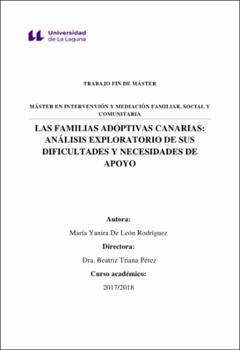Las familias adoptivas canarias: análisis exploratorio de sus dificultades y necesidades de apoyo
Fecha
2018Resumen
The aim of this study has been to deepen the reality of the adoptive families of the Canary
Islands, to determine their main difficulties and needs, and to know the support services and
resources they would like to have in the future, for their better adaptation. It is an exploratory
study with a mixed research approach. The sample is composed of 26 adoptive families, from
both provinces of the Canary Islands, which represent the diversity of structures that
4
characterize them. Participants completed a semi-structured questionnaire organized into six
blocks, which collect their opinion on the topics to explore. The results show, among other
aspects, diversity in the levels of adaptation of adopted children, at the beginning of family
life, and heterogeneity of problems. Thus, we can observe fewer problems of psychological
health and behavioral adaptation, and more difficulties of maturational adaptation or physical
health. During family life, many problems disappear and / or are reduced, but a percentage of
families still face relevant problems. In addition, it is observed that in cases where there are
problems associated with the adoptive condition, the participants relate them to the way of
being of the adoptees and their previous history, whereas when there are no such problems,
they attribute that condition to personal and behavioral characteristics of parents. Likewise,
the degree of support perceived during the years of family life is medium, being higher in
single-parent families. These supports are diverse, but families say they need more of them to
facilitate their dynamics in the future. Among them, they request: psychological support,
professional adoption experts, educational workshops, more actions in the pre-adoptive
period, and meetings with other adoptive families. These aspects should be taken into account
for interventions with adoptive families in the future. El objetivo de este estudio ha sido profundizar en la realidad que viven las familias adoptivas
canarias, para determinar sus principales dificultades y necesidades, y conocer con qué
servicios de apoyo y recursos les gustaría contar en el futuro, para su mejor adaptación. Se
trata de un estudio exploratorio con un enfoque de investigación mixto. La muestra está
compuesta por 26 familias adoptivas, procedentes de ambas provincias canarias, que
representan la diversidad de estructuras que las caracteriza. Los participantes cumplimentaron
un cuestionario semiestructurado, organizado en seis bloques, que recogen su opinión sobre
los temas a explorar. Los resultados muestran, entre otros aspectos, diversidad en los niveles
de adaptación de los hijos adoptados, al inicio de la convivencia, y heterogeneidad de
problemáticas. Así, se observan menos problemas de salud psicológica y de adaptación
comportamental, y más dificultades de adaptación madurativa o de salud física. Durante la
convivencia, muchos problemas desaparecen y/o se reducen, aunque un porcentaje de
familias sigue afrontando problemas de cierta relevancia. Además, se observa que en los
casos donde existe presencia de problemas asociados a la condición adoptiva, los
participantes los relacionan con la forma de ser de los adoptados y su historia previa, mientras
que en aquéllos que no hay tales problemas, atribuyen dicha condición a características
personales y de comportamiento de los padres. Asimismo, el grado de apoyo percibido
durante los años de convivencia es medio, siendo superior en familias monoparentales.
Dichos apoyos son diversos, pero las familias comentan requerir un mayor número de ellos
para facilitar su dinámica en el futuro. Entre ellos solicitan apoyo psicológico, profesionales
expertos en adopción, talleres educativos, mayores actuaciones en el periodo pre-adoptivo, y
encuentros con otras familias adoptivas, aspectos que deben tomarse en cuenta para futuras
intervenciones con familias adoptivas.




